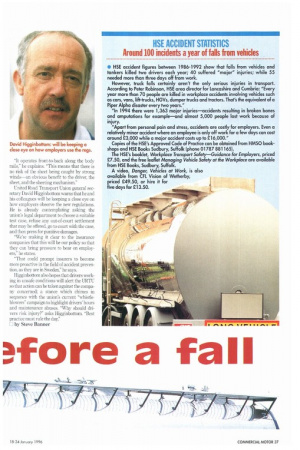T anker operators failing to provide a safe system of work
Page 38

Page 39

If you've noticed an error in this article please click here to report it so we can fix it.
can already be taken to court under the Health and Safety at Work Act 1974, as fuel distributor Charringtons discovered last year when a driver died at one of its depots.
The company was prosecuted by Norwich City Council under Section 2 of the act after driver Peter Bunn fell while refilling his tanker's tank container. Bunn died nine days after the accident, which occurred at the company's Cm-row Road, Norwich depot which has since closed.
Neither the refuelling gantry nor the tanker had handrails. Charringtons pleaded guilty, and was fined $216,500 plus costs of more than 1:1,800 (CM18-24 May 1995).
Despite the risk of such accidents and the existence of the Health & Safety at Work Act, plus the new regulations, fuel tanker operators remain reluctant to fit safety rails.
The swing away from overhead gantries to loading from ground level means there are far fewer occasions where drivers have to climb on to the vehicle, argues Texaco manager, fuel services, Mick Walker. This means fencing has become less and less necessary.
"We bottom-load more than 90% of the time. The trouble with a safety rail is that it adds to the cost of the vehicle, and the weight cuts the carrying capacity by around 400 litres," Walker says.
A tank-top collapsible rail can cost from £1,000 to .£1,500 depending on whether it was installed when the vehicle was built, or fitted later. And there's no need to worry that the driver will leave it upright and hash overhead obstructions when he drives away, says Horace Caddick, sales director at Bilstonbased tanker builder Thompson Carmichael.
"The ones we fit are usually linked to the braking system, so if the rail is up, the brakes remain on," he explains.
The rail can be automatically raised when the bottom section of the ladder up to the catwalk is pulled down.
While admitting that there are still one or two die-hard fuel forecourt operators who ask the driver to dip the tanker to ensure that they're not getting short measure on their delivery; enormous improvements to electronic metering equipment means that manual dipping isn't really necessary nowadays, Texaco's Walker believes.
"We may eventually say to these customers that on health and safety grounds we are not prepared to dip," he adds.
It doesn't take place during driver-controlled deliveries. Walker points out. Often made at night or over the weekend, they involve the driver handling the entire delivery process himself, without a member of the forecourt staff being present.
Some 180 of those fuel stations hanging out the Texaco sign now accept driver-controlled deliveries out of a total of more than 650. The trend has allowed Texaco to reduce its tanker fleet from 120 vehicles 18 months ago to 56 today, all operated on its behalf by Wincanton. "We've achieved far better fleet utilisation because we can work our trucks round-the-clock." Walker says.
Shell's stance is much the same as Texaco's. A spokesman says that while none of its forecourt delivery tankers is fitted with safety rails, they're ground-loaded 99% of the time. It's rare for drivers to be asked to dip the tanker at a service station, he adds, but the request can still be made.
Pressure on tipper operators to switch to safer working practices has prompted tipper gear specialist Harsh to launch three sheeting systems in the 15K. One of them, Slide 'n' Go, is the safest and easiest sheeting system available anywhere, claims Harsh managing director Grant Faulkner.
"It operates front-to-back along the body rails," he explains, "This means that there is no risk of the sheet being caught by strong winds—an obvious benefit to the driver, the sheet, and the sheeting mechanism."
United Road Transport Union general secretary David Higginbottom warns that he and his colleagues will he keeping a close eye on how employers observe the new regulations. He is already contemplating asking the union's legal department to choose a suitable test case, refuse any out-of-court settlement that may be offered, go to court with the case, and then press for punitive damages.
Were making it clear to the insurance companies that this will be our policy so that they can bring pressure to bear on employers," he states.
"That could prompt insurers to become more proactive in the field of accident prevention, as they are in Sweden," he says.
Higginbottom also hopes that drivers working in unsafe conditions will alert the URTU so that action can be taken against the company concerned; a stance which chimes in sequence with the union's current "whistleblowers" campaign to highlight drivers' hours and maintenance abuses. "Why should drivers risk injury?" asks Higginbottom. "Best practice must rule the day," 11! by Steve Banner
































































































